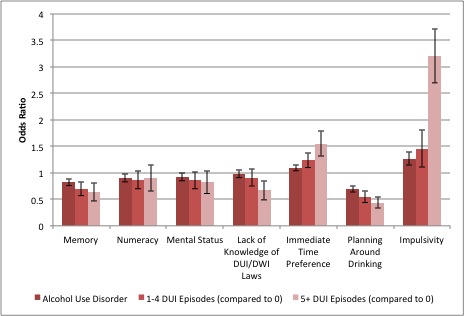The DRAM, Vol. 10(13) – Rationality, education, and intoxicated driving: More than just the facts, ma’am
Unlike traditional economics, behavioral economics recognizes that people do not always make decisions in entirely rational ways. However, certain decisions can be imperfectly rational (i.e., basically rational but flawed because of cognitive deficits, biases, or lack of understanding of consequences) or irrational (i.e., based on emotions and personality instead of consideration of future consequences), and this distinction has implications for how we intervene to change behavior. This week’s DRAM, part of a Special Series on Driving Under the Influence of Intoxicants, reviews a study by Sloan, Eldred, and Xu (2014) that tests whether driving after drinking can be understood as an imperfectly rational decision or irrational behavior.
Methods
- The researchers used data from the Survey of Alcohol and Driving, a study that surveyed 1,634 adults in eight cities, using a variety of techniques including random digit dialing and advertisements.
- To participate, individuals needed to report having driven and having drunk alcohol (but not necessarily at the same time) in the past month.
- Measures used in the current study included:
- Self-report of past year frequency of driving while at least “slightly intoxicated”, coded as 5+ times, 1-4 times, or 0 times;
- Alcohol use disorder, as assessed via The CAGE.
- Markers of imperfectly rational decision-making:
- Scales assessing cognitive ability, including memory, numeracy, and mental status;
- Lack of knowledge of local DUI/DWI laws (to measure understanding of consequences);
- A task measuring participants’ tendency to choose small immediate gains over greater future gains. Immediate time preference is associated with lack of self-control and addictive behaviors – see WAGER 7(7).
- Markers of irrational decision-making:
- Questions assessing participants’ planning (or lack thereof) around drinking and driving after drinking;
- A measure of impulsivity
- The researchers tested whether driving after drinking contributed to the prediction of each variable set over and above alcohol use disorder, using regression and logit models.
Results
- 695 of the 1,634 participants (42.5%) reported driving after drinking in the past year.
- As Figure 1 shows, after controlling for alcohol use disorder, participants who reported drinking and driving:
- Reported having worse memory, but did not differ from others on numeracy or mental status, and had better knowledge of DUI laws than others;
- Had more immediate time preferences than others;
- Engaged in less planning around drinking and driving and scored higher on impulsivity than others.
Figure 1. Odds Ratios for Models Predicting Participant Characteristics from Alcohol Use Disorder and Frequency of Intoxicated Driving. * = Adjusted odds ratio significantly different from 1. (Adapted from Sloan et al., 2014.)
Limitations
- The sample was not representative of the general population, so effects might be city- or sample-specific.
- Measures of drinking and driving, memory, planning, and impulsivity were self-report, so are vulnerable to self-report biases.
- The distinction between imperfectly rational behavior and irrational behavior is not entirely clear. The authors considered time preference to be a measure of imperfectly rational decision-making. However, it is also closely associated with impulsivity and irrational behavior.
Conclusions
The results of this study suggest that cognitive impairments distinguish people with alcohol use disorders from those without but do not account strongly for drinking and driving behavior. Those who reported drinking and driving in this study had some self-reported memory problems, but did not differ from others on mental status or numeric ability. They also had a better knowledge of local DUI/DWI laws and could therefore presumably anticipate the consequences of their actions. Instead, DUI was more closely linked with preferring immediate gains, lack of planning, and impulsivity. This suggests that people who engage in drunk or drugged driving will benefit more from interventions that address underlying self-control and mental health issues than from interventions that focus on general alcohol and DUI education.
– Sarah Nelson
What do you think? Please use the comment link below to provide feedback on this article.
Reference
Sloan, F. A., Eldred, L. M., & Xu, Y. (2014). The behavioral economics of drunk driving. Journal of Health Economics, 35, 64-81.
